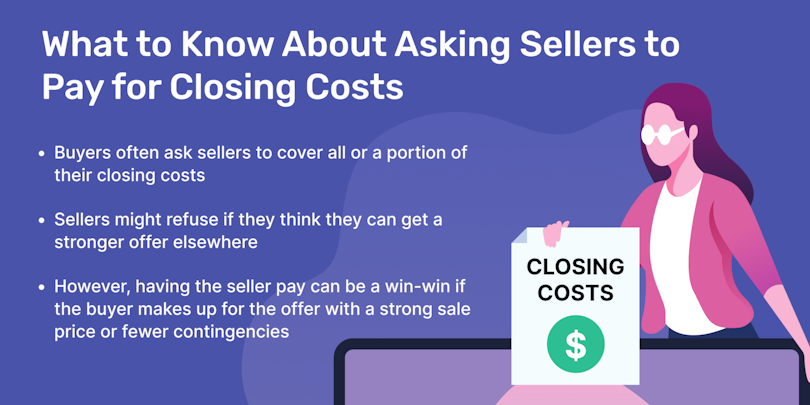The short answer: yes, sellers can refuse to pay their buyer’s closing costs. Sometimes, they may be unwilling or unable to cover this cost — but in other situations, having the seller pay for the buyer’s fees can actually be a win for both parties.

Often buyers negotiate to have sellers cover their closing costs when they submit an offer. They do this to reduce the amount of cash they have to bring to closing.
Sellers can refuse when asked to pay for the buyer's closing costs. Accounting for commission, sellers already owe closing costs equivalent to 8-10% of the final sale price, so sometimes the cost of paying for the buyer's closing costs will be more than they're willing to pay. In other cases, sellers may believe that they'll have better offers.
However that's not to say that paying for buyer's closing costs is inherently a negative thing for a seller. Sometimes the best offer they receive will include them covering their buyer's closing cost. Furthermore, if the seller is having a hard time finding interested buyers, they may be willing to cover their buyer's closing costs just to close the deal.
Below we cover how closing costs work, why buyers often arrange to have sellers cover these expenses, and how you may be able to negotiate these fees even after you've signed a purchase agreement.
JUMP TO SECTION
- What closing costs do buyers pay for?
- Why do sellers pay their buyer's closing costs?
- Can you negotiate closing costs after signing a purchase agreement?
- What happens if the seller refuses to pay for closing costs?
What closing costs do buyers pay for?
Buyers typically pay 2-5% of the home’s purchase price in closing costs. The buyer is usually responsible for costs like:
- Lender fees
- Appraisal fees
- Prepayment for property taxes and homeowners insurance.
Sellers also have to pay closing costs, but they are typically much cheaper: just 1-3% of the home’s sale price. However, on top of closing costs, sellers also pay for realtor commissions— which can amount to a hefty 5-6%.
» MORE: Who Pays Closing Costs?
If you’re a buyer, remember that — unlike you! — your seller isn’t paying these fees out of pocket: sellers usually pay for their closing costs and realtor fees out of the proceeds generated from the home sale.
In contrast, closing costs are often a significant out-of-pocket expense for buyers. Remember, as a buyer, you already have to shell out for your down payment, which could be around 20%.
Buyers that are short on cash — or don't want to completely deplete their savings! — may choose to negotiate to have the seller cover all or some of their closing costs.
Why do sellers pay their buyer's closing costs?
You may assume that paying for a buyer's closing costs would be seen as a negative for home sellers — this is not always the case.
Home sellers consider a number of factors when evaluating an offer. It’s in their best interest to choose the offer that best aligns with their goals and needs. For some sellers, that might mean a higher sale price; for others, a faster close date.
When a buyer asks the seller to pay for their closing costs, the seller will weigh that cost against these other factors to decide if it’s worth their while:
- Price: Higher offer prices can offset the costs of having to pay for a buyer's closing costs.
- Mortgage qualifications: Sellers favor buyers that are prequalified for a mortgage or have otherwise demonstrated their financial qualifications.
- Contingencies: Sellers prefer offers with as few contingencies as possible. Contingencies give buyers opportunities to back out of the home sale — therefore increasing the likelihood that the deal will fall through.
- Closing date: Buyer that are able to close quickly, or are flexible when it comes to closing dates, are generally preferred by home sellers.
The key to getting a seller to pay for closing costs is to submit an offer that is strong enough in one of these other areas.
Knowing your seller’s goals and situation can help you make the right concessions for both sides to walk away happy: if your seller is under pressure to sell quickly, you should probably try to offer a sooner closing date or fewer contingencies, instead of offering to pay a higher price.
Below, we've listed some common scenarios where seller's might choose to pay their buyer's closing costs:
| Scenario: | Why paying for a buyer's closing costs is a good deal for the seller: |
|---|---|
| The seller agrees to cover the buyer's closing costs, in exchange for a higher sale price. | They earn just as much from the sale. |
| The seller's home has been on the market for a while and has struggled to attract interested buyers. | They open themselves up to a greater pool of potential buyers. |
| A buyer offers to buy the house as-is — with no inspection contingencies — and requests that they cover their closing costs. | They won't have to negotiate repairs, or risk that the deal falls through because of an issue brought up during a home inspection. |
Can you negotiate closing costs after signing a purchase agreement?
Once you sign a purchase agreement, it’s binding: you must adhere to the terms or face legal consequences. However, that's not to say that you won't have the option to renegotiate closing costs after your initial offer when buying a home.
Buyers can renegotiate the terms of the sale by taking advantage of contingencies that are baked into the original offer. In fact, it is quite common for real estate deals to be renegotiated, especially after the inspection period.
As a buyer, if your contract includes a period for renegotiation after an inspection or visit to the property, you can ask your seller to cover your closing costs even if that wasn’t a condition of the original purchase agreement.
Here's an example of how a re-negotiation over closing costs works in action:
- A buyer and seller enter into a purchase agreement contract that includes a home inspection contingency.
- The buyer orders a home inspection, which reveals issues with the home that would require a $2,000 repair.
- Instead of backing out of the deal or renegotiating the purchase price, the seller agrees to credit the buyer $2,000 at closing to help the buyer cover closing costs.
» MORE: How Inspection Contingencies Work
What happens if the seller refuses to pay for closing costs?
So what happens if you've signed a purchase agreement, are all set to close, and the seller refuses to pay closing costs?
If one party violates the terms of the purchase agreement — which could be the case if they refuse to pay closing costs — the other party can take legal action against them. This could result in the at-fault party either paying damages, or being ordered to perform a specific action — such as paying for closing costs.
Note, legal action that results in a judgement could take a long time to resolve (possibly years) — and you may be better off agreeing to renegotiate the terms of the sale.





